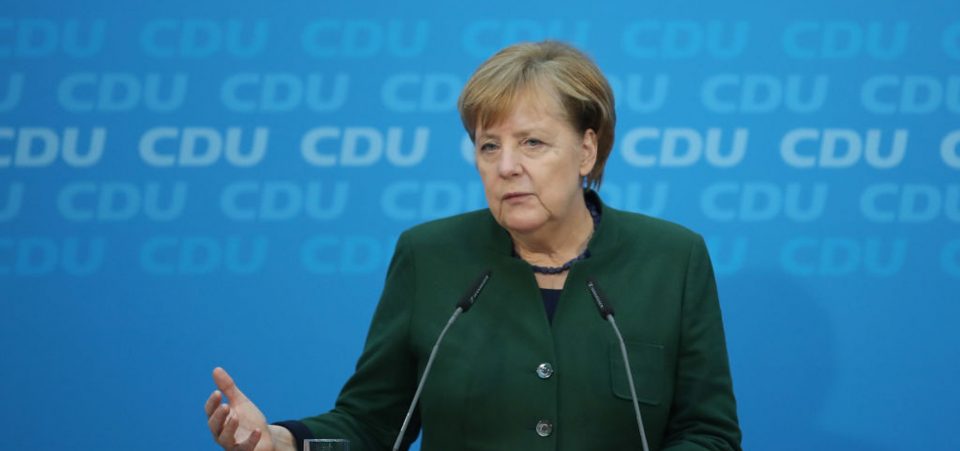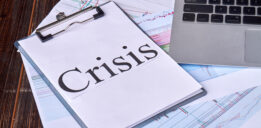Merkel May Be on the Way Out Amid Echoes of Weimar
The parliamentary election of September 25, 2017, might be Germany’s biggest political event since the fall of the Berlin Wall—and not in a good way. Although Angela Merkel secured a fourth term as Chancellor, the Christian Democratic Union of Germany (CDU) is forced to seek a partner. Merkel has sought the backing of the moderate left, so far to no avail. The alternative would be to ally her party with the far-right Alternative for Deutschland (AfD) party, and nobody in Germany or Europe would be ready for that prospect.
The first major political crisis post-WW2 coincides with the fact that for the first time in the Federal Republic of Germany, a far-right party has entered the halls of the Bundestag—Germany’s parliament—and then some. The AfD has become Germany’s third-strongest party, receiving almost 13% of the votes, or triple the amount from the previous elections in 2013.
The prospect that Germans will have to head back to the polls early in 2018 is ever more likely. In the meantime, to avoid another—potentially dangerous (more on that below)—election because of its parallels with 1933 and the fate of Weimar, Angela Merkel will likely pull all the stops to form a “Grosse-Koalition,” or Grand Coalition, with the Social Democratic Party of Germany (SPD). Many are dubbing this the “Jamaica” coalition because it would bring together three parties whose colors are black, yellow, and green.
Mark Twain is believed to have said that “history doesn’t repeat itself, but it often rhymes.” This statement alone may help to explain why so many fear the AfD and why Chancellor Merkel will avoid a coalition with it at all costs, including the cost of another election.
Students of 20th–century history will remember that in 1928, the National-Socialists on the right won 2.6% of the vote. In 1930, another election gave the Nazis 18.3%. In the wake of the Great Depression that intensified in the early 1930s, the Nazis gained more ground, while the Social Democrats lost about 20%.
Alexander Gauland, one of the AfD leaders, promised to reclaim “our Volk” after AfD’s surprising success in the September election. “Volk” is one of those words that brings back unpleasant memories in Germany. (Source: “Return of the German Volk,” The New York Times, September 29, 2017.)
The Most Serious Political Crisis in Germany Since 1945
It’s the most serious political crisis in Germany since the end of World War 2. The last time that anything comparable to the current political instability in Berlin occurred was in the 1920s and early 1930s. The impasse ended in the collapse of the Weimar Republic and the arrival of one Adolf Hitler as Reichskanzler (Chancellor).
Instability, given the role that Germany has played in the European Union (particularly in the wake of the 2008 financial crisis) will affect the rest of the European Union as well. The last time the extreme won enough votes to affect the outcome of an election was in 1933, just as the last time Germany held two successive elections within months or weeks of each other was also in 1933. It came in the wake of a disastrous war loss, heavy war reparations, and a global economic depression. The big question now, of course, is: What led to the AfD’s rise in 2017?
Angela Merkel has often been described as the most powerful woman in the world—if not the most powerful person. Whoever should inherit her office will also exercise great power. That’s why what happens in Germany in the next few months matters to Germans, Europeans, and Americans. It also matters to Russia, of course. The EU can expect weeks or even months of political impasse, which could easily produce economic paralysis just as signs of growth were emerging.
Some Europeans have liked Angela Merkel; others have not. Since first becoming Chancellor in 2005, she has earned everyone’s respect. It was during her leadership that Germany became Europe’s economic locomotive, dominating the euro currency in the process. Unemployment has also dropped during her tenure, even if immigration has increased. If that weren’t good enough, Germany has one of the most economically balanced societies in the world.
Angela Merkel Is Not Blaming Putin or Fake News
Germany is one of the few places where a veritable “middle class” still exists. In other words, nothing could be more different than Germany and the United States, where a non-establishment candidate won the presidential elections. It’s inconceivable that the leader of a country that has managed to achieve such successful macroeconomic indicators should struggle to form a government.
In the United States, Angela Merkel would probably have won a landslide, had she run for President. So, as the German Chancellor might be too busy pondering her next move to analyze “What Happened,” write a book about it, or blame Vladimir Putin, others have.
The others, who have pondered over the failure to get a sufficient majority, might even ask Angela Merkel to resign ahead of the next vote. It all comes down to a single issue, which once had favorable connotations, but no longer does for many in Europe and Germany: Immigration.
It was the issue of immigration that has fueled the rise of right-wing populists everywhere in Europe and cost Angela Merkel the votes that would have given her the majority she needed. Chancellor Merkel opened the gates to asylum seekers—many of whom are from Syria—in what was an overly ambitious (and generous) policy.
The immigration policy will now haunt Merkel. It will stand in the way of a coalition agreement because none of the parties slated to coalesce politically can agree on how many asylum seekers Germany should accept. Nor can they agree over whom has or hasn’t the right to family reunification in Germany.
Environmental issues, moreover, would hamper Alliance ’90/The Greens party, who want to bring a quick end of coal power and internal combustion engines. Imagine if, given BMW‘s, Mercedes Benz‘s, and Porsche‘s presence in Germany, any serious political leaders would propose an accelerated demise of the automobile.
On her side, Merkel can rely on the delay factor. The Constitution does not set a time limit for the formation of a government coalition. Given the depth of the divisions, the task looks harsh. Thus, new elections remain the only option. Between now and the next vote, Merkel will lead a weakened Germany without the political mandate, which will struggle to take important decisions.
The immigration issue is clearly one to resolve. The flow of migrants and refugees from Syria will have been stemmed from the fact that the Syrian government is already working on the reconstruction as ISIS has been defeated.
Still, it doesn’t change the fact that there are hundreds of thousands of refugees in Germany, whom the AfD party can use as scapegoats to gain more supporters, should the situation be resolved by another vote. Unless Merkel can produce a stunning rabbit from her hat in the next few months, the far right could gain more votes.
Is It the End of the Merkel Era?
The President of the Federal Republic of Germany, Frank-Walter Steinmeier, will try to persuade the parties that could reasonably govern together to form a coalition before he’s forced to call a vote. In this perspective, the European Union, still struggling to cope with Brexit, would fall into a state of more uncertainty.
An analysis of the performance of the right in recent election shows that Merkel also lost for having run Germany too much like an administrator. She offered no vision to her base. Thus, they chose the nationalist conservatives of the AfD on one hand and the fiscal conservatives of the Free Democratic Party (FDP), who demand a tougher stance on Greece (they would have much preferred a Grexit than a Brexit), on the other. Thus, as has happened with so many European elections, the main parties have suffered a dilution that has weakened the ability of many governments to rule. The U.K., Italy, and Spain come to mind.
Angela Merkel’s party has also paid for the fact that its ministers were the ones, essentially, driving the anti-EU sentiment of its voters. They demanded excessive concessions and shamed poorer EU countries such as Greece. Some, such as Wolfgang Schäuble (now President of the Bundestag), promptly harassed many of Germany’s EU partners into fiscal austerity, impacting the other countries’ ability to emerge from the 2008 crisis. At the same time, they fueled populist attitudes in Germany, which clashed with Merkel’s own centrism.
Thus, unless Merkel herself is prepared to make a move to the right, she will fail to build sufficient support to win a majority to govern. There are three potential scenarios and none spare Angela Merkel.
The first is that she leads her party in another electoral round, which could return an even deeper picture of division, prompting her resignation. The second is that she resigns before the next election, pays the price that Germans demand of her for the refugee/migrant influx, and the CDU returns to power through a more fiscally conservative leader, who could form an alliance with the FDP. The third scenario is that, at the last moment, the German Chancellor manages to secure the aforementioned Jamaica coalition, averting the elections altogether and stopping right-wing populisms from spreading in the Bundestag…again. Of these, the third seems the best and the most improbable.






